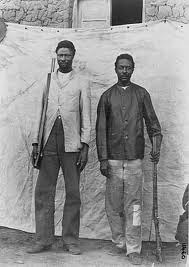
Samuel and Julius Maherero, leaders of the Herero rebellion against German imperialism in 1904. The Germans, in retaliation, killed 60,000 Africans and enslaved many more for over 80 years., a photo by Pan-African News Wire File Photos on Flickr.
Thursday, 27 December 2012
Sankara Kamara
On December 10, the international community celebrated the 64th anniversary of the “Universal Declaration of Human Rights.”
On the same day in 1948, the phrase “International Community,” assumed a new meaning when the United Nations General Assembly adopted the “Universal Declaration of Human Rights.”
By formally making “human rights” international, the world became a place where the dignity of every human being is theoretically recognised.
The purpose of this article is to edify young African minds by discussing an aspect of our history slowly forgotten by some of Africa’s educational systems.
From Cape Town in South Africa to Freetown in Sierra Leone, young African minds continue to be engrossed by modernity without necessarily trying to understand what it means to be an African in a world held hostage by imperialism.
In the fast-paced world in which we live, it is easy to forget that the African continent has trekked a long way, from the throes of colonial rule to the emergence of “independent” states in the 1960s.
Rather than use modernity’s comforts to delve into their history and keep it alive, modern-day Africans are actually losing their history to willful ignorance, one generation at a time.
I cannot end this article without letting young Africans know that before the “Universal Declaration of Human Rights” in 1948, international law — as understood by Europeans — did not recognise the human rights of Africans.
The European powers which colonised the African continent, abolished the human rights of Africans by robbing the continent at gunpoint.
Were it not for the Carnation Revolution of 1974, which radically changed Portugal’s foreign policy toward people of colour, Lisbon would have continued to oppress its colonised Africans until the end of the 20th century.
Portugal was one of the earliest European powers to arrive in Africa as a coloniser and slave-catcher.
Disquietingly enough, Portugal did not grant independence to its African colonies until fairly recently, in 1975, one year after a leftist military coup forced Lisbon to end its costly wars of oppression in Africa.
How does a synopsis of colonial rule fit into the Universal Declaration of Human Rights?
The colonisation of Africa was based on the racist belief that Africans do not have human rights.
Animated by the racist beliefs of the day, the colonisation of Africa was conducted to destroy the indigenous institutions which kept African societies on an even keel.
On top of being exploitative, the colonisation of Africa came along with variants of cruelties that amounted to crimes against humanity.
The first amputations of innocent Africans were committed in the Congo, where King Leopold of Belgium killed millions of Africans with genocidal intent.
In the jostle to seize African territories and exploit the natural resources they contained, King Leopold of Belgium took over the Congo as virtual ruler, from 1885-1908.
A European fraudster living in an era of the imperial brutality approved by the Berlin Conference of 1884-1885, King Leopold fixed his gaze on the Congo, where he starved, amputated, and mass-murdered millions of Africans.
Alas, King Leopold was not the only mass-murderer with African blood on his hands.
While the Belgians literally gored their African subjects to death in the Congo, the Germans were similarly active in Namibia, where the German state committed its first genocide.
The Nazi extermination of the Jews was not the first genocide committed by a German state.
When the Herero people of Namibia rebelled against colonial rule in 1904, the German government responded with a killer Blitzkrieg, murdering tens of thousands of colonised Africans!
Germany wanted the Africans in Namibia to know that resistance against white supremacy would be met with European savagery.
A few decades after the German genocide against the Herero people in Namibia, the British Empire showed its fangs in colonial Kenya, where the nationalist Mau Mau movement was targeted for destruction in gulags and torture centres.
In 2004, the-then German Minister for Economic Development and Co-operation, Heidemarie W. Zeul, officially “apologised” for Germany’s killing sprees in Namibia, calling them a “genocide.”
Although the German spokeswoman recognised her country’s “guilt” and “moral responsibility” for the slaughter of Namibians, she implicitly refused to respect the human rights of the Africans murdered in that country.
Her argument was that today’s Germany cannot be legally responsible for the 1904 genocide in Namibia.
According to her twisted logic, there was no international law at the time to protect civilians against colonial brutality.
What the German politician was saying, albeit in codes, is that colonial-era Europe legally saw Africans as sub-humans marked for murder without consequences.
Sankara Kamara is a Sierra Leonean academic living in Atlanta. He has traveled extensively in West Africa, where he once lived and worked as a teacher and journalist.
No comments:
Post a Comment